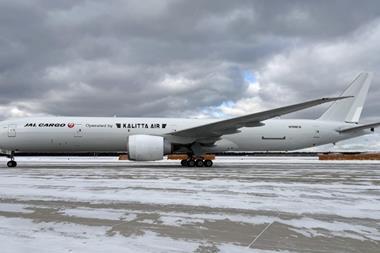Nepal's two strategic airports are to host a four-day training and assessment programme to develop a customised disaster response action plan.
Airport authorities, military and humanitarian partners will participate in Get Airports Ready for Disaster (GARD) workshops at Tribhuvan International Airport in Kathmandu and Nepalgunj Airport.
The workshops, led by Deutsche Post DHL Group (DPDHL) and the United Nations Development Programme (UNDP), will build on experience learned after a 7.8-magnitude earthquake struck Nepal in April 2015.
Within 48 hours, Nepal's main airport in Kathmandu was flooded with humanitarian aid supplies and rescue and relief teams coming in from all around the world.
However, about a week later, large aircraft were unable to land at the airport as the runway was damaged from the influx of flights delivering aid.
Being a landlocked country with a mountainous geography, Nepal relies heavily on air routes to transport aid and supplies during times of emergency.
The 2015 earthquakes have shown that an adequate level of infrastructure and effective logistical operations would not only save lives but help reduce economic loss.
More than 30 officials from government agencies and airports will attend the GARD workshops and allow participants and trainers to evaluate the current level of preparedness at the two airports.
They will go through trainings, provide concrete recommendations and an action plan to ensure that Nepal's airports are prepared for future disasters.
"The 2015 quake truly demonstrated the crucial role airports play in Nepal's national emergency response network," said Valerie Julliand, UNDP Resident Coordinator.
"We just can't wait for another disaster to strike to have strong and effective contingency plans to manage the flow of emergency relief goods to the people in need.
“The GARD workshop is a key milestone in UNDP's efforts to support the government in making Nepal a disaster-resilient country and the airports ready to implement immediate response actions in the event of a disaster."
The workshops will also raise awareness of Disaster Risk Reduction and identify priorities for investment in national infrastructure that could further improve the resilience of emergency supply chains during a disaster.
"A clear and flexible action plan can help airport operators to minimize logistics bottlenecks and better manage sudden influxes of relief aid, bulky supplies like food, water and medical supplies, as well as NGO personnel entering the country," said Chris Weeks, director of humanitarian affairs for DHL.
"Almost two years since we first went into Nepal in the earthquake's aftermath, it's especially heartening to see the government and airports considering preparedness as paramount, and incorporating it into action plans that could potentially save more lives in the future."
To date, GARD workshops have been held at around 40 airports in Armenia, Bangladesh, the Dominican Republic, El Salvador, India, Indonesia, Jordan, Lebanon, Macedonia, Nepal, Panama, Peru, the Philippines, the Seychelles, Sri Lanka and Turkey.










